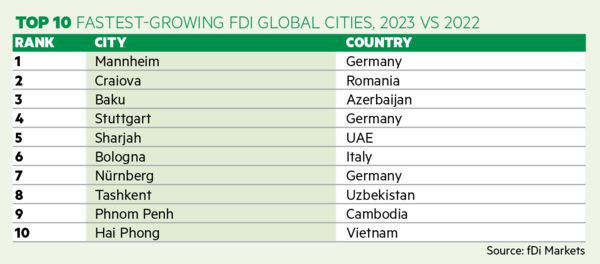Mannheim in south-west Germany posted the strongest annual growth in FDI of any city last year, as both new and existing foreign investors laid out expansion plans to make use of its connectivity and talent pool.
About $390m was pledged to 15 greenfield FDI projects in Mannheim in 2023, up from just three projects in 2022, according to fDi Markets data.
Advertisement
Mannheim, which is home to 330,000 people, is in the Rhine-Neckar Triangle, a metropolitan region at the intersection of three German federal states: Baden-Württemberg, Hessen and Rhineland-Palatinate.
Among Mannheim’s FDI projects in 2023 were six expansions by existing foreign investors, the highest number since records began in 2003. This included Belgian plastic pipe maker Aliaxis, which is investing €50m to expand its production facility in Mannheim.
Mannheim’s position between the cities of Frankfurt and Stuttgart, where it can be difficult to find space, has made it a target for corporates, small and medium-sized enterprises and start-ups.
“From a logistics perspective, it’s perfectly located within south-west Germany,” says Karim Rochdi, CEO of Aventos Group, a Berlin-based investment manager which is developing the Vareal business park on a brownfield site in Mannheim.
This is echoed by recent foreign investors. South Korean construction equipment manufacturer HD Hyundai Infracore is developing a new site in Mannheim which will include office space and training, parts and service centres.
Rene Halter, a member of the management board of the company’s German subsidiary, says that proximity to Frankfurt airport and the Autobahn network make Mannheim a convenient location for companies selling into the wider region. Railway connections and an inland harbour in Mannheim, which includes container and roll-on, roll-off terminals, provide further connectivity to investing companies.
Advertisement
Life sciences support
Life sciences, which has been labelled as a strategic sector for Mannheim since 2011, has been a key growth area. Swiss pharmaceutical giant Roche Group, which entered the city in 1997 when it acquired Boehringer Mannheim, is investing more than €160m in its Mannheim campus. This investment is to develop a new centre for mass spectrometry, an office and training building and the expansion of Roche’s diagnostics production.
Martin Haag, the head of Roche’s site in Mannheim, tells fDi that the city is a “good area” for investment into automation thanks to good links with universities in the region, including Karlsruhe Institute of Technology and the German Cancer Research Centre in Heidelberg.
“The multiple public and private universities and research institutions based in Mannheim [and the broader region] are instrumental to attracting FDI,” says Elmar Bourdon, deputy director in the city of Mannheim’s office of economic affairs and structural development.
Among the recent investors making use of university infrastructure in Mannheim and the Rhine-Neckar region is Japan’s NEC Corporation. In March 2023, it formed a company called NEC Bio Therapeutics, which is using AI to identify new drugs to fight cancer and infectious diseases.
Heinz Lubenau, CEO of NEC Bio Therapeutics, tells fDi that Mannheim and Heidelberg boast a good talent pool of medically skilled staff, who are essential for the biotech industry. About 31,000 university students are in Mannheim, according to official figures, with a further 45,000 in the surrounding region. “From my experience, it is not very hard to get good people on board in this area,” says Mr Lubenau.
Do you want more FDI stories delivered directly to your inbox? Subscribe to our newsletters.
This article first appeared in the April/May 2024 print edition of fDi Intelligence.
